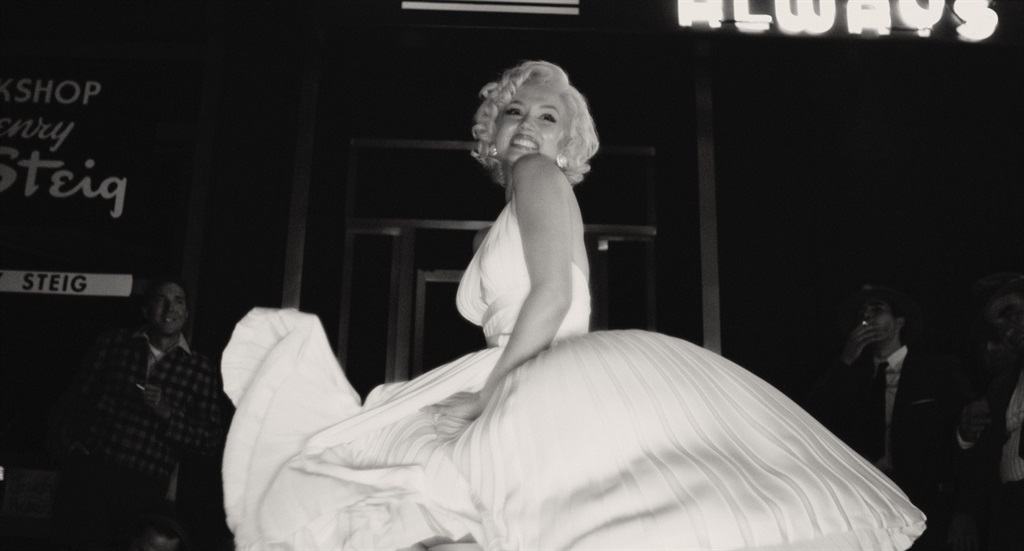
MOVIE:
Blonde
WHERE TO WATCH:
OUR RATING:
3/5 Stars
WHAT IT'S ABOUT:
This highly fictionalised life story of one Norma Jean Baker, better known to the world as Marilyn Monroe, tells how a traumatised childhood with a mentally ill mother and lack of a father figure did not stop Norma Jean from becoming world-famous. Still, it informed everything from her early drive towards success, her catastrophic relationships with men, her descent into drug-fuelled paranoia and her tragic death at only 36. Based on the novel by Joyce Carol Oates.WHAT WE THOUGHT:
Boy, where to begin with this...
Touted as Netflix's first NC-17 film in America (basically an 18 everywhere else, but it prevents the film from being advertised or even shown in some parts of the sometimes shockingly conservative US of A), the controversy surrounding Blonde in the months leading up to its release turned out to be nothing in comparison to the reception it received when it finally hit.
After a very short, limited theatrical run in parts of the US and Europe, Blonde was released worldwide on Netflix last Wednesday, and despite hitting the top of Netflix's top 10 chart, it has provoked serious outrage from, well, almost everyone. Well, everyone, that is, except those who actually really liked it. For all of the hoo-ha about its age restriction, it was not the film's "adult content" that caused a stir. This is hardly surprising, of course. It's certainly very much "adults only" with sex, nudity, sexual violence, strong language, and, um, foetal horror all present and accounted for, but it's hardly the first "adults only" film or TV series to hit Netflix. Frankly, the whole NC-17 thing did nothing but show, once again, how ass-backwards the MPAA rating board in the States truly is.
No, most of the outrage directed at Andrew Dominik's provocative film is that it does a serious disservice to the woman we all know as Marilyn Monroe. And make absolutely no mistake, it does do exactly that. The Marilyn Monroe – or, more accurately, the Norma Jean Baker – portrayed by Ana de Armas in Blonde is a wholly pathetic, tragic figure with little of the significant charm and none of the serious comic chops of her real-life counterpart.
Worst of all, while the real Norma Jean Baker was a very tragic figure, and she was working in a system that was already pretty brutal to women – especially beautiful women – the way she is portrayed here gives her even less agency than she had in real life. It certainly captures little of the strength and grace she is known to have shown as she navigated the "Golden Age" of Hollywood. Certainly, this Norma Jean never ever seems actually to enjoy being Marilyn Monroe.
Here's the rub: this film may be about the icon that was Marilyn Monroe, but it really isn't about the real Norma Jean Baker. It's based not on biography, let alone autobiography, but a novel by Joyce Carol Oates. Oates repeatedly asserted that she was interested less in the real Norma Jean Baker than in using what she rightly sees as the definitive Hollywood Megastar to examine the dichotomy between someone's public and private persona. And Dominik – who already showed an interest in the same subject matter with his brilliant The Assassination of Jesse James By the Coward Robert Ford – is clearly interested in doing the same with a film that is much more a psychological thriller, even horror, than a biopic.
This puts it in a very similar space as last year's Princess Diana non-biopic, Spencer. But it's even more fictitious, even more of a horror film, and even more "art house" than Pablo Larrain's "imagined" vision of the 20th century's other most iconic, tragic blonde. I actually haven't heard Spencer being brought up much in connection with this film, which is surprising as the two films are so similar and would make an interesting, if harrowing, double-bill.
Unfortunately, while I certainly don't agree with the outrage that Blonde has received (though I do understand it), I also don't think it's entirely successful. While it has plenty to recommend it, I find the film to be a major step down from the likes of both Spencer and the Assassination of Jesse James...
First, the good stuff; Ana de Armas is the obvious highlight here. Her accent occasionally peaks through, and she is somewhat saddled playing a particularly bleak version of Marilyn Monroe that limits her ability to showcase her own serious charm and comic timing, but she is astounding here.She does a very good impression of Monroe, yes – and major props to the makeup department and Dominik himself, who, without resorting to distracting prosthetics, somehow managed to make someone who looks almost nothing like Marilyn Monroe look exactly like Marilyn Monroe. But her magnetic screen presence and full-blooded commitment to the part really shine through here. This is not exactly a quiet film, and hers is not exactly a quiet performance, but it is a truly exceptional one that will no doubt get all sorts of recognition come awards season.
The film also looks incredible. "Over-directed", maybe, but even looking past the switching between aspect ratios and black & white and colour, Dominik's self-admitted interest in the image of Marilyn Monroe rather than in her essence results, inevitably, in a film that can at times be enjoyed more as a piece of art-in-motion than as a conventional narrative. The haunting score by Nick Cave and Warren Ellis is, if anything, even more captivating, and clearly, plenty of attention has been paid to the sound mixing, too, as the film becomes all the more immersive when listening to it through a good pair of stereo headphones.
I don't say this lightly, but at its best, Blonde reminds me of David Lynch at his most provocative, with Mulholland Drive, Lost Highway or even Twin Peaks: The Return feeling like antecedents of what Dominik has gone for here. And for a film that is nominally about Marilyn Monroe, that's really quite extraordinary.
Most importantly, while these audio-visual aspects of the film are wonderful in and of themselves, they work on so visceral a level that the film may well actually have the same amount of emotional power if it was entirely wordless. And "emotional power" is really the key here. You don't simply watch Marilyn Monroe's descent into hysteria (a word to perhaps be used advisably here), but you feel it right down to your bones. The film may or may not be a horror film on a narrative or stylistic level, but it certainly feels like one. This doesn't exactly make it an easy watch, but it certainly does make it an emotionally compelling one.
Well, up to a point, anyway.
For all that the film works on a technical level, on a performance level (de Armas is joined by heavy hitters like Bobby Cannavale and Adrien Brody) and on a visceral level, it is, frankly, far too one-note and far too... empty to justify its quite punishing 167 minute run time.
Dominik's repeated focus on the image of Marilyn Monroe and not Norma Jean Baker herself is, in the end, the film's undoing. Part of it is the inevitable question of why either Dominik or Oates centred their story around Marilyn Monroe when they don't overly care about capturing even the basic details of her actual life and instead needlessly embellish them. To be fair, considering just how many biopics there have been over the years about Marilyn Monroe, it's hard to blame them for opting for some sort of "ecstatic truth", as Werner Herzog would put it.
What I certainly can blame Blonde for, though, is that it absolutely doesn't come anywhere near a truth, let alone an ecstatic one – or, at least, not a truth that we haven't heard before or one that we haven't heard told significantly better. There's no sense of purpose to be felt as you reach the end of what is basically nearly three hours of abject misery; no sense that you've been enlightened about anything that the film addresses: be it stardom, childhood trauma, absent parents, insanity, addiction, fame, or Marilyn Monroe herself.
Strip away the art-house sheen and the powerhouse central performance, and you're left with a film that just doesn't seem like it has very much to say. It would be fine if it was really just a very effective psychological horror flick, but it isn't. Between being too long to maintain that sense of dread and its adding to a long tradition of exploitative writing about Marilyn Monroe, it ends up feeling both significantly less than the sum of its many very impressive parts and, honestly, more than a little icky.
So, yes, nominate Ana de Armas for all the awards and certainly do check the film out if you're interested in some beautiful but challenging filmmaking, but for heaven's sake, just don't go in expecting a film that comes within a thousand miles of doing justice to one of cinema's most enduring icons – or one that's anywhere near as profound or even as provocative as it so clearly thinks it is.
WATCH THE TRAILER HERE:
Blonde is available to stream on Netflix




 Publications
Publications
 Partners
Partners












